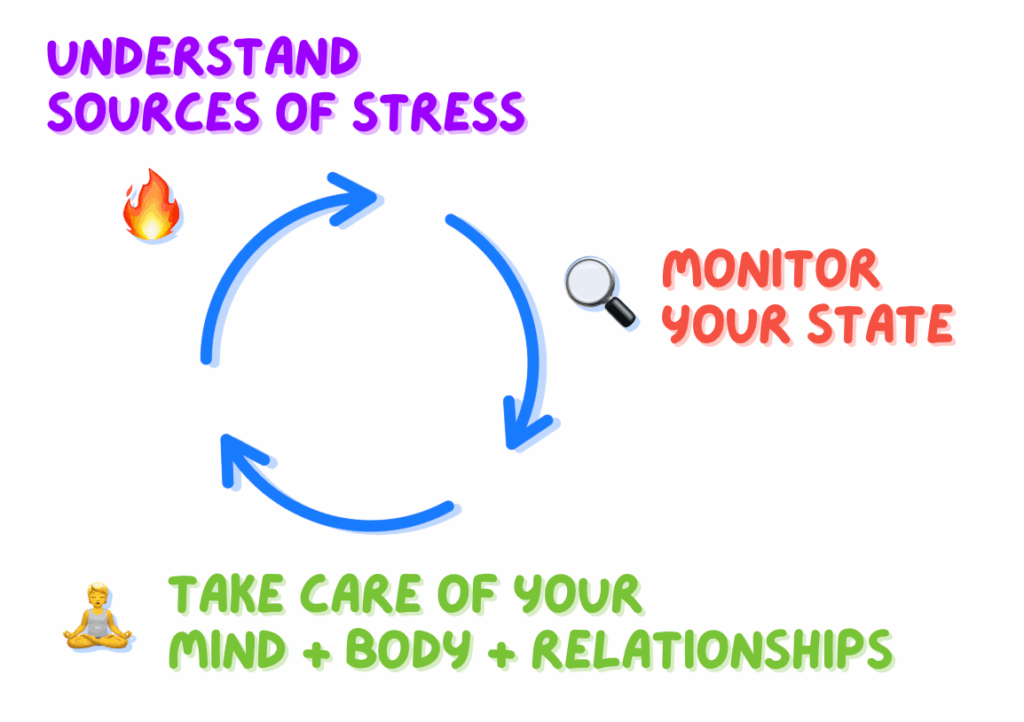Entrepreneurship is often seen as an exciting path filled with opportunities and innovation, but the reality behind the glamour can be far more complex. Founders and business owners frequently face intense pressures that challenge their mental well-being.
From juggling financial responsibilities to managing the fear of failure, the emotional strain can be overwhelming. Studies reveal that nearly 88% of entrepreneurs report grappling with mental health issues, and over half experience anxiety.
The constant demands of running a business can lead to chronic stress, exhaustion, and disrupted sleep, creating a cycle that’s hard to break. World Mental Health Day, recognized every October, highlights the growing link between mental health and work. This article focuses on addressing how work environments can better support mental health, especially for entrepreneurs handling these challenges.
Maintaining mental health is not only surviving the startup grind. One has to find balance and adopt practical strategies to grow. With the right tools, founders can protect their well-being while building successful ventures.
This article will explore proven ways for founders to manage stress, prevent burnout, and support emotional well-being while running their businesses.
Table of Contents
Recognizing and Addressing Stress and Burnout
Entrepreneurs often find themselves under immense pressure, handling endless responsibilities to meet their goals. This can lead to stress and burnout that sometimes go unnoticed until it spirals into more serious mental health concerns. Recognizing the early warning signs is important for taking steps to prioritize self-care and prevent further challenges.
Some common indicators of stress and burnout include:
- Persistent Fatigue: Feeling drained, even after resting, can be an early sign that your body and mind are overwhelmed.
- Helplessness or Feeling Trapped: A sense of being stuck with no way out can create emotional distress and reduce productivity.
- Cynicism or Doubt: Losing confidence in yourself or your vision can signal a deeper sense of burnout.
- Isolation or Detachment: Pulling away from family, friends, or colleagues is another red flag to watch out for.
- Procrastination: Delaying tasks, even important ones, often stems from feeling overwhelmed or unmotivated.
- Weakened Immune System: Frequent colds or illnesses might mean stress is taking a toll on your physical health.
- Aches and Pains: Unexplained physical discomfort, such as headaches or muscle tension, often results from prolonged stress.
Recognizing these signs early gives entrepreneurs the opportunity to take action. Whether it’s adjusting workloads, seeking support, or incorporating wellness routines, addressing stress and burnout is important to maintain both mental and physical health.
Practical Strategies to Support Mental Health
Here are some effective methods to help entrepreneurs manage stress, maintain balance, and build resilience.
Building Focus to Reduce Anxiety
Entrepreneurs often feel overwhelmed. This occurs when attention shifts rapidly between tasks, creating mental chaos. Gaining control over focus is key to managing these feelings. Understanding how the mind works allows individuals to direct attention consciously.
Practicing single-task focus helps in grounding awareness and keeping thoughts clear. Engaging in positive activities, such as exercise or creative hobbies, redirects energy and reinforces a calmer state of mind. These simple steps can transform an anxious mindset into one of clarity and logical thinking.
Balancing Life Through Regular Adjustment
Managing mental health in a fast-paced entrepreneurial life often requires deliberate recalibration. A useful method is evaluating key areas of life regularly and adjusting efforts in each. Reflecting on aspects such as personal growth, financial goals, physical health, and relationships can reveal where adjustments are needed.

Small shifts in focus, like prioritizing self-care or dedicating time to hobbies, help maintain balance and prevent burnout. This continuous fine-tuning keeps both work and personal life steady, even amid challenges.
Setting Boundaries for Sustainable Success
Healthy boundaries are important for preserving mental health. Entrepreneurs benefit from limiting distractions by turning off notifications during personal time. Scheduling regular moments with loved ones strengthens relationships and provides emotional support.
Communicating availability to colleagues creates structure, reducing interruptions during focused work periods. Blocking time for deep work avoids the temptation to carry tasks home, supporting a healthier work-life divide. Learning to say no to excessive commitments is another critical step in avoiding stress and creating balance.
Managing Stress in the Moment
Stress often feels overpowering because reasoning alone cannot diminish it. Addressing it in real time requires actionable methods, such as technology that calms the nervous system. Tools utilizing techniques like bilateral stimulation offer immediate stress relief by soothing the mind. These practical approaches can help entrepreneurs stay composed during high-pressure situations and avoid prolonged periods of tension.
Incorporating Mindfulness with Technology
Modern tools can make mindfulness more accessible. Devices that monitor energy patterns allow individuals to develop routines customized to their needs. Gadgets that use sound or vibration therapy create a state of relaxation, helping both body and mind recover. By using such tools consistently, entrepreneurs can maintain a state of calm, improving both productivity and well-being.
Steps to Prevent Burnout

Burnout can be prevented by adopting proactive measures. Prioritizing sleep is vital for mental and physical recovery. Taking regular breaks, even when working from home, refreshes the mind and reduces strain. Finding purpose in daily tasks gives work greater meaning and lowers stress. Redefining success to include well-being alongside professional achievements creates a healthier perspective. Learning to manage negative emotions also builds resilience, allowing for a more balanced approach to challenges.
Strengthening Inner Resilience
The path to mental wellness includes mastering inner thoughts. Silencing self-critical voices allows for greater confidence and clarity. Letting go of the need to control every outcome reduces unnecessary worry. Concentration techniques strengthen the subconscious mind, supporting a sense of peace and focus even during difficulties.
Movement, Mindset, and Connection
Mental resilience often relies on three foundational practices: movement, mindset, and connection. Physical activities like yoga or walking release tension and improve mood. Developing a supportive mindset through journaling or gratitude exercises encourages positivity. Meaningful connections with friends, family, or communities provide emotional strength and belonging. Together, these habits form a strong foundation for maintaining mental health in the entrepreneurial journey.
Lean on Peers for Support
When the weight of work feels overwhelming, reaching out to others can make a significant difference. Entrepreneurs often face the temptation to handle everything alone, thinking it will make them more efficient. However, relying on trusted colleagues, friends, or mentors can lighten the load.

Having someone to share concerns with can help put challenges into perspective, offer fresh solutions, or simply provide emotional support. By opening up to others, entrepreneurs can reduce feelings of isolation and find strength in connection. Building a support system of like-minded individuals can make navigating tough times much easier and prevent burnout.
Take Vacations and Breaks
Entrepreneurs may feel the urge to constantly stay engaged with their business, especially in the early stages when every task seems important. However, taking regular breaks and vacations allows the mind and body to recharge. Disconnecting from work, even briefly, can restore creativity, enhance decision-making, and improve focus when back at work.
Stepping away from the business, even if it feels challenging, can be the key to long-term success and well-being. Regular time off helps prevent burnout and fosters a healthier, more sustainable approach to entrepreneurship.
Building Resilience for Long-Term Success
Maintaining mental health is important for success, especially for entrepreneurs who face constant challenges. By recognizing the signs of stress and burnout, seeking support, and adopting practical strategies to manage pressure, individuals can protect their well-being.
Taking breaks, setting clear boundaries, and focusing on self-care are all key steps to ensuring long-term productivity and personal growth. Prioritizing mental health leads to better business outcomes and supports a healthier and more balanced life.
Have a vision for your business? Let us help you get started! At EvolveDash, we’re passionate about helping businesses grow and evolve in the digital world. Our team is here to help every step of the way, from developing custom mobile apps to creating personalized websites.
With a proven track record of helping over 100 satisfied customers and 450 completed projects, we’re confident we can help you achieve your goals too. Ready to prioritize your mental health and grow in 2025? Let’s turn your business vision into a sustainable success!
FAQs
How can founders overcome the fear of failure?
Founders can overcome the fear of failure by reframing it as an opportunity to learn. Embracing mistakes as part of the process and maintaining a growth mindset can help reduce fear. Setting realistic goals and focusing on incremental progress can also build confidence and reduce anxiety about potential setbacks.
What role does social support play in managing entrepreneurial stress?
Social support plays a crucial role in managing stress. Having trusted colleagues, mentors, or friends to talk to can provide emotional relief, offer new perspectives, and reduce feelings of isolation. Regularly connecting with others helps build resilience and can prevent burnout by offering encouragement and advice during tough times.
What are some simple techniques to enhance mental clarity during stressful periods? Techniques like deep breathing exercises, practicing gratitude, and taking short breaks can enhance mental clarity. Getting regular physical exercise, eating a balanced diet, and sleeping well also contributes to clearer thinking. Simplifying tasks and focusing on one thing at a time can reduce mental clutter and stress.
How can entrepreneurs stay motivated during difficult or stagnant periods?
Entrepreneurs can stay motivated by focusing on their long-term vision and breaking tasks into smaller, manageable steps. Reflecting on past achievements and surrounding themselves with positive influences can help maintain motivation. Finding new challenges, celebrating small wins, and staying connected with supportive peers can also keep spirits high.
How can regular physical activity help manage stress and improve mental health for entrepreneurs?
Regular physical activity releases endorphins, which help improve mood and reduce stress. Exercise also increases energy levels and improves focus, making it easier to handle work demands. Even simple activities like walking or stretching can help entrepreneurs stay calm, clear-headed, and resilient under pressure.
What is the importance of having hobbies or interests outside of work for mental well-being?
Hobbies provide a much-needed break from the demands of entrepreneurship. They help entrepreneurs relax, unwind, and recharge. Pursuing activities outside of work fosters creativity, boosts problem-solving skills, and promotes overall mental health by reducing stress and offering emotional fulfillment.



















